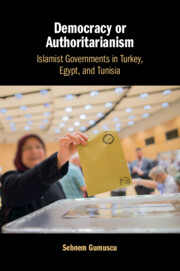6698 results in Middle East government, politics and policy
4 - Electoral Islamism and Killing the Dream of a Democratic Muslim Brotherhood
-
- Book:
- Democracy or Authoritarianism
- Published online:
- 09 March 2023
- Print publication:
- 16 March 2023, pp 143-201
-
- Chapter
- Export citation
4 - Bahrain
-
- Book:
- The Struggle for Supremacy in the Middle East
- Published online:
- 09 March 2023
- Print publication:
- 16 March 2023, pp 103-145
-
- Chapter
- Export citation
7 - Yemen
-
- Book:
- The Struggle for Supremacy in the Middle East
- Published online:
- 09 March 2023
- Print publication:
- 16 March 2023, pp 215-249
-
- Chapter
- Export citation
5 - Lebanon
-
- Book:
- The Struggle for Supremacy in the Middle East
- Published online:
- 09 March 2023
- Print publication:
- 16 March 2023, pp 146-184
-
- Chapter
- Export citation
Introduction
-
- Book:
- The Struggle for Supremacy in the Middle East
- Published online:
- 09 March 2023
- Print publication:
- 16 March 2023, pp 1-20
-
- Chapter
- Export citation
Bibliography
-
- Book:
- The Struggle for Supremacy in the Middle East
- Published online:
- 09 March 2023
- Print publication:
- 16 March 2023, pp 261-293
-
- Chapter
- Export citation
Introduction
-
- Book:
- Democracy or Authoritarianism
- Published online:
- 09 March 2023
- Print publication:
- 16 March 2023, pp 1-22
-
- Chapter
- Export citation
2 - A Theory of Intraparty Politics
-
- Book:
- Democracy or Authoritarianism
- Published online:
- 09 March 2023
- Print publication:
- 16 March 2023, pp 61-81
-
- Chapter
- Export citation
Dedication
-
- Book:
- The Struggle for Supremacy in the Middle East
- Published online:
- 09 March 2023
- Print publication:
- 16 March 2023, pp v-vi
-
- Chapter
- Export citation
3 - Iraq
-
- Book:
- The Struggle for Supremacy in the Middle East
- Published online:
- 09 March 2023
- Print publication:
- 16 March 2023, pp 77-102
-
- Chapter
- Export citation
Acknowledgements
-
- Book:
- The Struggle for Supremacy in the Middle East
- Published online:
- 09 March 2023
- Print publication:
- 16 March 2023, pp viii-x
-
- Chapter
- Export citation
6 - Syria
-
- Book:
- The Struggle for Supremacy in the Middle East
- Published online:
- 09 March 2023
- Print publication:
- 16 March 2023, pp 185-214
-
- Chapter
- Export citation
Interviews
-
- Book:
- Democracy or Authoritarianism
- Published online:
- 09 March 2023
- Print publication:
- 16 March 2023, pp 267-268
-
- Chapter
- Export citation
Index
-
- Book:
- Democracy or Authoritarianism
- Published online:
- 09 March 2023
- Print publication:
- 16 March 2023, pp 293-301
-
- Chapter
- Export citation
1 - Modernization, Inclusion, and Power
-
- Book:
- Democracy or Authoritarianism
- Published online:
- 09 March 2023
- Print publication:
- 16 March 2023, pp 23-60
-
- Chapter
- Export citation
Copyright page
-
- Book:
- The Struggle for Supremacy in the Middle East
- Published online:
- 09 March 2023
- Print publication:
- 16 March 2023, pp iv-iv
-
- Chapter
- Export citation
Acknowledgments
-
- Book:
- Democracy or Authoritarianism
- Published online:
- 09 March 2023
- Print publication:
- 16 March 2023, pp vii-viii
-
- Chapter
- Export citation

The Struggle for Supremacy in the Middle East
- Saudi Arabia and Iran
-
- Published online:
- 09 March 2023
- Print publication:
- 16 March 2023

Democracy or Authoritarianism
- Islamist Governments in Turkey, Egypt, and Tunisia
-
- Published online:
- 09 March 2023
- Print publication:
- 16 March 2023
Prolegomenon: A Two-Layered Book
-
- Book:
- Violence and Representation in the Arab Uprisings
- Published online:
- 02 February 2023
- Print publication:
- 09 February 2023, pp 1-10
-
- Chapter
- Export citation

